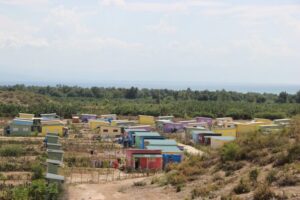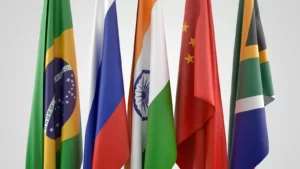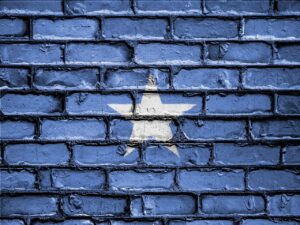- Since its founding, ECOWAS has played an important role in West African politics, intervening in conflicts and coups to preserve order and democracy;
- The complexity of African countries’ policies tests the alliance’s ability to coordinate solutions to frequent coups in the region;
- The departure of important countries from the alliance demonstrates internal tensions and concerns about the direction of the organization.
ECOWAS has played a central role in the political dynamics and stability in West Africa since its inception.
However, its effectiveness faces significant tests in the face of recurring challenges related to military coups, political instability and governance crises plaguing West Africa.

What is ECOWAS and which countries are participating?
ECOWAS (Economic Community of West African States), is a regional organization composed of 15 countries in West Africa and was initially formed from the former French, British, and Portuguese territories in the region and independent Liberia.
The community was established with the aim of promoting economic cooperation and regional integration among member states but has also evolved to include political and military cooperation. ECOWAS was founded on May 28, 1975, in Lagos, Nigeria, and came into effect in 1977.
The member countries of ECOWAS are:
- Benin
- Burkina Faso
- Cape Verde
- Ivory Coast
- Gambia
- Ghana
- Guinea
- Guinea-Bissau
- Liberia
- Mali
- Niger
- Nigeria
- Senegal
- Sierra Leone
- Togo
Since the 1990s, ECOWAS has been active in the region known as the “coup belt” and has sought to promote democracy against authoritarian regimes. According to the BBC, 78% of coups in Sub-Saharan Africa since 1990 occurred in former French colonies, raising questions about the impact of French influence on the region’s stability.
In response, transitional governments in Mali and Burkina Faso canceled military agreements with France and removed French as the official language. ECOWAS, however, faced criticism for what were considered mild and ineffective responses in the early 2020s when three member countries experienced military coups.
For these and other reasons, Mali, Burkina Faso, and Niger announced their immediate withdrawal from the Economic Community of West African States in January 2024. Currently governed by military authorities who took over from civilian leaders, the three countries, founding members of ECOWAS in 1975, expressed disappointment with the direction of the organization.
The spokesman for the Niger junta, Colonel Amadou Abdramane, lamented the perceived distance between ECOWAS and the original ideals of Pan-Africanism, criticizing the organization’s failure to effectively support countries in the fight against terrorism and insecurity.
ECOWAS Interventions in Conflicts and Military Coups
ECOWAS interventions in conflicts and military coups in the West African region are a significant part of its efforts to promote stability in the region.
The organization has demonstrated proactivity in intervening in critical situations, seeking to resolve conflicts and restore political order. Here are some notable examples of the organization’s interventions, along with an assessment of the effectiveness of these actions and the challenges faced:
- Intervention in the Liberian Civil War (1990-1997):
- In 1990, West African leaders sent a neutral military force, the Economic Community of West African States Monitoring Group (ECOMOG), to intervene in the civil war in Liberia between the forces of the President and rebel factions, restoring some security.
- The presence of approximately 12,000 ECOMOG soldiers in Liberia resulted in a series of human rights abuses, despite helping to bring stability to the region, and these troops withdrew in 1999, two years after Charles Taylor was elected President.
- After the end of the 14-year conflict in 2003, West African forces were mobilized again to maintain peace, with about 3,600 troops redeployed for a UN peacekeeping operation that lasted until 2018.
- Intervention in the Sierra Leone Civil War (1999-2000):
- In 1998, a Nigerian-led ECOMOG force intervened in the Sierra Leone civil war, aiming to drive out a junta and allied rebels from the capital Freetown, restoring President Ahmad Tejan Kabbah, who had been deposed in a coup the previous year.
- Following the successful intervention in 2000, the ECOMOG force withdrew, transferring peacekeeping operations to a UN mission, marking the end of a decade-long conflict.
- Intervention in the Political Crisis in Ivory Coast (2010-2011):
- In response to the political crisis and former President Laurent Gbagbo’s refusal to accept election results, ECOWAS took measures to restore stability in Ivory Coast.
- The ECOWAS-led intervention, with support from the international community, contributed to resolving the crisis and installing elected President Alassane Ouattara. However, some challenges persisted, highlighting the complexity of political dynamics in the region.
- Gambia (2017):
- In 2017, ECOWAS mobilized 7,000 Senegalese soldiers to Gambia, forcing President Yahya Jammeh into exile and transferring the presidency to Adama Barrow after he was defeated in the elections.
- The operation, dubbed “Restoration of Democracy,” was conducted without facing resistance from Jammeh’s security forces and was therefore considered a major success.
Throughout ECOWAS interventions in conflicts, facing challenges with logistical and financial coordination has been a constant reality. Organizational problems and insufficient financial resources have directly impacted the efficiency of operations.
Another critical point concerns the issues of legitimacy and impartiality that some interventions have faced. Thus, criticisms were directed at ECOWAS highlighting the need to address these shortcomings.
Recent coups or attempted coups in which ECOWAS was involved and China’s silence in intervening in these events
- Gabon – 2023 (Coup):
- Niger – 2023 (Coup):
- A coup d’état took place in Niger on July 26, 2023, led by the presidential guard, resulting in the removal and detention of President Mohamed Bazoum. General Abdourahamane Tchiani proclaimed himself the leader of the country, establishing the National Council for the Safeguard of the Fatherland.
- In response, ECOWAS issued an ultimatum on July 30, demanding Bazoum’s reinstatement by August 6, threatening international sanctions and the use of force. After the deadline expired on August 10, ECOWAS activated its standby force in preparation for a possible military intervention. Tensions continue as the political situation in Niger remains volatile, with the military junta appointing a new government and ECOWAS seeking diplomatic solutions to restore constitutional order.
- Burkina Faso – 2022 (Coup) and 2023 (Coup Attempt):
- Following NATO’s intervention in the First Libyan Civil War in 2011, Islamic attacks in Burkina Faso and Mali intensified, leading Burkina Faso to fight against the Islamic State and Al-Qaeda in parts of the country since 2015. However, the military forces faced significant challenges due to lack of equipment and logistics, resulting in discontent among the military.
- In August 2021, 100 members of the Burkina Faso Armed Forces conspired to take control of the country, culminating in a successful coup in January 2022. The military detained President Roch Marc Christian Kaboré and suspended the government, parliament, and constitution. The military junta imposed a curfew, closed borders, and promised to organize new elections. The African Union and ECOWAS suspended Burkina Faso after the coup. President Kaboré resigned, and Paul-Henri Sandaogo Damiba was appointed interim president, with a three-year transition process for new elections planned.
- On September 25, 2023, Jeune Afrique magazine published an article on growing tensions among discontented military officials in Ouagadougou. Tensions arose after the death of Zanga Moumouni Traore, a VDP commander, during a confrontation with jihadists near Bobo-Dioulasso, due to a lack of proper equipment. As a result, the junta of Burkina Faso suspended Jeune Afrique from reporting within the country, labeling the articles as “false.”
- On the night of September 26, pro-Traoré social media accounts posted messages encouraging junta supporters, colloquially known as “Guardians of the Transition,” to protest in support of Traoré following rumors of a possible coup. Pro-junta protests also occurred in the cities of Bobo-Dioulasso and Gaoua. On the morning of September 27, minor protests erupted in central Ouagadougou against Traoré’s government but were quickly dispersed. That night, the junta stated that an attempted coup by high-ranking security officials had been thwarted thanks to intelligence gathered by Burkina Faso’s intelligence agency. Four officials were arrested in connection with the coup attempt, and two others were fugitives.
- Guinea – 2021 (Coup):
- Colonel Mamady Doumbouya ousted President Alpha Condé in 2021 after Condé amended the constitution to seek a third term. On September 5, 2023, Guinean soldiers fired near the Presidential Palace in Conakry, resulting in the detention of President Alpha Condé by military forces. Colonel Mamady Doumbouya announced on state television the dissolution of the government, annulment of the constitution, and establishment of a National Committee for Reconciliation and Development to lead an 18-month transition.
- After Condé’s ousting, the military junta imposed a national curfew, replaced regional leaders and ministers with military commissioners and secretaries-general, and declared full control over the armed forces and the country’s administration. The challenge now is to ensure the return to civilian government and address popular dissatisfaction.
- Chad – 2021 (Coup):
- After FACT attacks in April 2021, clashes between Chadian government forces and rebels resulted in the death of President Idriss Déby in combat. His son, Mahamat Déby, took control of the Transitional Military Council of Chad (TMC).
- Despite government claims of victory, fighting persisted, generating international concerns and protests in N’Djamena for a civilian transition. Countries like France, the United States, and China expressed their positions, while Chadians protested against military acquisition and the TMC banned demonstrations.
- Mali – 2020 (Coup) and 2021 (Counter-coup):
- Protests in Mali in June 2020, motivated by various issues, culminated in a coup d’état on August 18, 2020. Protesters demanded the resignation of President Keïta, leading the military to take control.
- After Keïta’s resignation, the military formed the National Committee for the Salvation of the People and imposed a curfew. They promised new elections, while experts proposed a two-year interim government. In September, Bah Ndaw was appointed interim president, marking the beginning of an 18-month political transition.
- In August 2020, President Keïta was removed from power by military led by Assimi Goïta and Ismaël Wagué, after months of political unrest. Keïta resigned, making way for the National Committee for the Salvation of the People (CNSP), promising future elections.
- Tensions arose between the civilian transition government and the military, leading to a second coup in May 2021, with N’Daw and Ouane being ousted. Goïta was appointed transition president. ECOWAS intervened, but the military government proposed extending the transition for another five years, resulting in sanctions and later an agreement for general elections by February 2024.
In the face of these events, China, as the world’s second-largest economy, chose to remain silent on most of the coups in Africa due to strategic and political reasons:
- Principle of non-intervention in the internal affairs of other countries: China traditionally follows a policy of non-intervention in the internal affairs of other countries, as part of its diplomacy known as “non-interference in internal affairs.” This means that China avoids criticizing or interfering in the internal political issues of other countries, including military coups, unless its own security or vital interests are directly threatened.
- Maintenance of good diplomatic relations: By remaining neutral regarding coups, China avoids alienating established governments or new leaders emerging from these volatile political situations. This allows China to maintain stable commercial and diplomatic relations with African countries, regardless of who is in power.
- Protection of its investments: By avoiding taking sides in political coups, China seeks to protect its investments and commercial interests in Africa. Taking a public stance could lead to retaliations by coup leaders or their supporters, jeopardizing Chinese projects and businesses in the region.
- Prioritization of stability and continuity: Political stability is crucial for China’s long-term interests in Africa. By remaining neutral, China seeks to maintain political stability in the region, avoiding triggering further conflicts or instabilities by taking sides in coups.
China’s strategic position seeks to preserve its long-term political and economic interests in the region, thus the little – or absence of – Chinese manifestation against coup attempts and coups is justified.
What is the importance of ECOWAS in West African stability and geopolitics?
As military coups and political crises continue to challenge stability in West Africa, ECOWAS finds itself at a crossroads.
The organization’s history of interventions in conflicts highlights its importance in promoting political stability, defending democratic principles, economic collaboration, and regional security cooperation. ECOWAS interventions in conflicts and coups demonstrate its determination to preserve constitutional order and defend democratic principles in the region.
Although it has faced criticism for what are considered mild responses in some situations, the organization has played a vital role in resolving crises and restoring stability in countries like Liberia, Sierra Leone, Gambia, and Ivory Coast.
However, internal resistance in affected countries, lack of popular support, and complex local politics test its ability to coordinate effective actions in the face of frequent coups that burden the region. In this scenario, the importance of ECOWAS for West African geopolitics remains crucial, despite its recent difficulties, especially in the face of recent coups and coup attempts in countries like Niger, Burkina Faso, and Mali.
The withdrawal of these countries from ECOWAS reflects internal tensions and concerns about the direction of the organization. Furthermore, China’s position as the world’s second-largest economy, choosing to remain silent in the face of most of these events, highlights the complexity of geopolitical dynamics in the region and the need for an assertive approach to promote stability.
In light of this, even though the organization has been essential at various times for promoting stability in the region and has acted as a counterbalance to threats such as military coups and governmental instability, the ECOWAS community is clearly weakened, especially with the departure of three of its notable members. This could bring even more future instability to a historically fragile region of the globe.





Be First to Comment